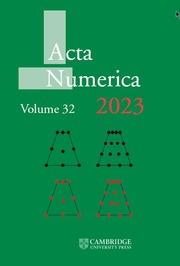Crossref Citations
This article has been cited by the following publications. This list is generated based on data provided by
Crossref.
Bremer, James
Rokhlin, Vladimir
and
Sammis, Ian
2010.
Universal quadratures for boundary integral equations on two-dimensional domains with corners.
Journal of Computational Physics,
Vol. 229,
Issue. 22,
p.
8259.
Johnson, Steven G.
2011.
Casimir Physics.
Vol. 834,
Issue. ,
p.
175.
Kropinski, Mary Catherine A.
and
Quaife, Bryan D.
2011.
Fast integral equation methods for the modified Helmholtz equation.
Journal of Computational Physics,
Vol. 230,
Issue. 2,
p.
425.
Chai, Wenwen
and
Jiao, Dan
2011.
Dense Matrix Inversion of Linear Complexity for Integral-Equation-Based Large-Scale 3-D Capacitance Extraction.
IEEE Transactions on Microwave Theory and Techniques,
Vol. 59,
Issue. 10,
p.
2404.
Xu, Zhenli
and
Cai, Wei
2011.
Fast Analytical Methods for Macroscopic Electrostatic Models in Biomolecular Simulations.
SIAM Review,
Vol. 53,
Issue. 4,
p.
683.
Schobert, Dennis T.
and
Eibert, Thomas F.
2012.
Fast Integral Equation Solution by Multilevel Green's Function Interpolation Combined With Multilevel Fast Multipole Method.
IEEE Transactions on Antennas and Propagation,
Vol. 60,
Issue. 9,
p.
4458.
Bardhan, Jaydeep P
2012.
Biomolecular electrostatics—I want your solvation (model).
Computational Science & Discovery,
Vol. 5,
Issue. 1,
p.
013001.
Pan, Xiao‐Min
Wei, Jian‐Gong
Peng, Zhen
and
Sheng, Xin‐Qing
2012.
A fast algorithm for multiscale electromagnetic problems using interpolative decomposition and multilevel fast multipole algorithm.
Radio Science,
Vol. 47,
Issue. 1,
Schmitz, Phillip G.
and
Ying, Lexing
2012.
A fast direct solver for elliptic problems on general meshes in 2D.
Journal of Computational Physics,
Vol. 231,
Issue. 4,
p.
1314.
Wei, Jian-gong
Peng, Zhen
and
Lee, Jin-Fa
2012.
A hierarchical multi-level fast multipole method for wideband multiscale electromagnetic wave scattering from non-penetrable targets in R<sup>3</sup>.
p.
1.
Wei, Jian‐Gong
Peng, Zhen
and
Lee, Jin‐Fa
2012.
A fast direct matrix solver for surface integral equation methods for electromagnetic wave scattering from non‐penetrable targets.
Radio Science,
Vol. 47,
Issue. 5,
Ho, Kenneth L.
and
Greengard, Leslie
2012.
A Fast Direct Solver for Structured Linear Systems by Recursive Skeletonization.
SIAM Journal on Scientific Computing,
Vol. 34,
Issue. 5,
p.
A2507.
Jiang, Shidong
Veerapaneni, Shravan
and
Greengard, Leslie
2012.
Integral Equation Methods for Unsteady Stokes Flow in Two Dimensions.
SIAM Journal on Scientific Computing,
Vol. 34,
Issue. 4,
p.
A2197.
Gillman, Adrianna
Young, Patrick M.
and
Martinsson, Per-Gunnar
2012.
A direct solver with O(N) complexity for integral equations on one-dimensional domains.
Frontiers of Mathematics in China,
Vol. 7,
Issue. 2,
p.
217.
Geng, Weihua
and
Krasny, Robert
2013.
A treecode-accelerated boundary integral Poisson–Boltzmann solver for electrostatics of solvated biomolecules.
Journal of Computational Physics,
Vol. 247,
Issue. ,
p.
62.
Wei, Jian-Gong
Peng, Zhen
and
Lee, Jin-Fa
2013.
Wideband EMC/EMI analysis using skeletonalized domain decomposition method.
p.
1318.
Ambikasaran, Sivaram
and
Darve, Eric
2013.
An $$\mathcal O (N \log N)$$ O ( N log N ) Fast Direct Solver for Partial Hierarchically Semi-Separable Matrices.
Journal of Scientific Computing,
Vol. 57,
Issue. 3,
p.
477.
Chai, Wenwen
and
Jiao, Dan
2013.
Direct Matrix Solution of Linear Complexity for Surface Integral-Equation-Based Impedance Extraction of Complicated 3-D Structures.
Proceedings of the IEEE,
Vol. 101,
Issue. 2,
p.
372.
Pan, Xiao-Min
and
Sheng, Xin-Qing
2013.
Preconditioning Technique in the Interpolative Decomposition Multilevel Fast Multipole Algorithm.
IEEE Transactions on Antennas and Propagation,
Vol. 61,
Issue. 6,
p.
3373.
Gueyffier, Denis
Fromentin-Denoziere, Beatrice
Simon, Jerome
Merlen, Alain
and
Giovangigli, Vincent
2013.
Numerical Simulation of Ionized Rocket Plumes.




